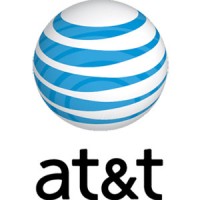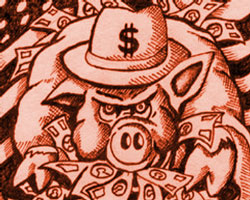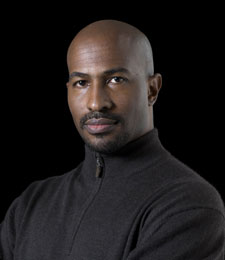 There’s so much one can say and write about last month’s Supreme Court ruling that allows corporations to weigh in and spend unlimited amounts on campaign contributions. One thing is certain-it’s about to get nasty and ugly. The bottom line is, no matter how many ways people try to justify this ruling under the umbrella of ‘free speech’, it’s only a matter of time before the realization hits that it’s not exactly Free Speech when only the rich and powerful have access and can afford to voice their opinions on traditional powerful mediums.
There’s so much one can say and write about last month’s Supreme Court ruling that allows corporations to weigh in and spend unlimited amounts on campaign contributions. One thing is certain-it’s about to get nasty and ugly. The bottom line is, no matter how many ways people try to justify this ruling under the umbrella of ‘free speech’, it’s only a matter of time before the realization hits that it’s not exactly Free Speech when only the rich and powerful have access and can afford to voice their opinions on traditional powerful mediums.
We often forget that radio and other media outlets are corporations and with all the criticisms we have about the bias of news outlets like Fox or if you’re on the other side of the political spectrum, the so-called ‘left leaning’ media, that in itself should be proof that an unbridled corporate voice could be really, really bad. The fact that our airwaves are now dominated by over-the-top political pundits who have become more and more strident and divisive over the past 5-10 years should have rung a few alarms, but sadly we are at a day and time where people have been lulled into believing that
1-There’s always opportunity to lay out one’s ideas via the internet.
2-Things aren’t so bad as long as they can see or hear their own political viewpoint.

Look for corporations like AT&T to take full advantge of the new Supreme Court Ruling by campaigning to eliminate free speech on the Internet
A couple of things to keep in mind… First and foremost, we better make note that some of these corporations who are now free to spend billions are spending billions of dollars on law makers via lobbying efforts to cripple the internet and stifle the opportunity for the little guy to reach millions. Companies like AT&T and Comcast have been working night and day to get rid of Net Neutrality, which has allowed a free and open internet up til now. As we noted in recent stories thse corporate telecoms outfits are spending millions to sponsor events put on by law makers that represent communities of color as well as traditional Civil Rights organizations.
As unbelievable as it sounds, the end result has been the majority of members in both the Congressional Black and Hispanic Caucuses siding with AT&T and other telecoms that want to bring about a restricted and consolidated internet. Even more disturbing is seeing organizations like LULAC and the NAACP who have held events heavily sponsored by AT&T take supportive positions.
What’s even sadder is noting that these expensive lobbying efforts were happening before the Supreme Court ruling, where these corporate telecoms still had constraints and rules that limited them. All thats about to change big time. One of the first places you are likely to see the impact of this Supreme Court decision will be in the form of aggressive campaigns launched by the telecoms supporting lawmakers who are willing to eliminate Net Neutrality and cripple ‘free speech’ for the average John Doe on the internet. How ironic that the granting of unrestricted speech to corporations will result in them using likely their far reaching destructive power to shut down free speech for others.

2 or 3 years ago AT&T brought computers for Chicago congressman Bobby Rush who then turned around and voted to eliminated Net Neutrality via the COPE Act
Many of these corporate telecoms simply don’t want a blogger who writes from home to be on the same playing field as a big newspaper or giant media outlets. They want faster and more efficient access to be granted to those who can pay and like I said earlier, millions of dollars have already been put in the coffers of Black and Brown leaders in both Congress and Civil Rights organizations who have had their votes and support brought and paid for…
Now that the Supreme Court has unbridled these corporations, you will see these efforts increase as these corporations will start looking for influencial groups and individuals who desperately need money in these economically challenged times for crucial projects and events or as was the case with Congressman Bobby Rush in Chicago, new computers for a school and write them big checks in an ‘unspoken’/’Unwritten’ exchange for votes, support or silence. Many law makers will go for the short-term relief and not concern themselves with long-term damage. We all need to pay close attention because we are about to see some strange and disturbing political pairings.
The other widely held viewpoint is-as long as one can see or hear their own political viewpoint via a popular media outlet, then there’s no reason to trip off the Supreme Court’s ruling. This is shortsighted and rooted in the belief that one’s favorite medium will always be forever and in a position to effectively champion ‘the cause’. The recent closing and filing of bankruptcy by progressive leaning Air America should serve as a strong reminder this is not always the case.
Air America was supposed to be a viable alternative to the increasing use of right-wing talk show hosts on corporate radio, many who were accused of being racist, homophobic and carriers of ‘Hate Speech’. With Air America gone there has been no replacement and even if one makes the argument that it wasn’t as popular as its right-wing counterparts, it nevertheless served an audience and represented an important voice and political perspective that is now is gone. Where does one go now, keeping in mind the assault to corporations to cripple free sppech and control the Internet?

Glenn Beck led a corporate backed assault against political foes in the Obama White House. The end result was two were forced to resign
How bad can things get? Well, we’ve all seen the type of damage that can be inflicted when a corporation pours money and resources into unrelenting attacks in political arenas. Fox News host Glenn Beck‘s vicious on air assaults on White House appointees Van Jones and Yoshi Sergent are two prime examples. Beck was relentless and there was very few opportunities and outlets for Jones and his supporters to really strike back. The end result was both Jones and Sergent resigning and an emboldened Beck promising to intensify his crusade and go after other White House appointees. If Beck’s attacks weren’t an example of corporate free speech gone wild then I don’t know what is.. What i do know is that after last month’s ruling such attacks will increases tenfold with very few protections for those lacking resources and access.
On the political flipside to the Beck’s attacks, within urban America we have Radio One, the largest Black owned radio outlet which has long come under fire by leadership in the African American community. many have lambasted the outlet for not taking advantage of its enormous reach and influence within the Black community to help raise political awareness and social consciousness on a variety of important topics versus dumbing down the audience and relying on the constant ressurection of troubling stereotypes of ignorance and buffonary. Radio one has noted that they have a well respected talk show line up which includes Civil Rights leader Al Sharpton and lawyer Warren Ballentine among others..However, that punditry is rarely shared or exposed on their day-to-day music oriented stations which attract the largest number of listeners.

Radio One owner Cathy Hughes is using her popular media corporation to try and unseat Black lawmakers who she disagrees with over a proposed bill that she says will weaken her radio stations.
Last year Congressman John Conyers introduced a bill HR 848 which would force radio stations to pay an extra tax to record labels for each song they played. It’s a policy I definitely don’t agree and it sparked a big debate within many communities. Some took the proposed bill as a referendum against lack of politicalness of Black radio and Radio One in particular and came out in full support. This resulted in Radio One owner Cathy Hughes taking to the airwaves and running a series of in-house political ads and editorials designed to unseat Black lawmakers including Conyers and Houston’s Sheila Jackson Lee. Hughes took things a step further by refusing to run ads or editorials that countered her concerns. The 2010 elections will show how impactful those ads were. It was the topic of discussion during a heated panel I sat on during the most recent Congressional Black Caucus gathering where there was a lot of back and forth and haggling to squelch the assaults. Again I bring this up because all this took place prior to the Supreme Court ruling. Imagine how much crazier it will get now that corporations are free to say and do as they wish…
The Supreme Court ruling that allows corporations the right to weigh in and contribute to elections unrestricted is not only dangerous, but one that many including those who seem to think its ok will come to regret sooner or later. Those who support this ruling are those who simply have not been on the receiving end of such attacks and influence. The nature of corporations in America is grow and make as much profit as possible and eliminate an and all obstacles in way of its goals. Right now its easy to dismiss this because a Yoshi Sergent, Van Jones, Sheila Jackson Lee etc, don’t impact the day to day lives of most people. But after those victims of corporate assaults are eliminated who’s next? Will it be your church? civic group?, union? or son, daughter, mother or father voicing a strong opinion to an important issue?
 What happens to the voice of coal miners in West Virginia when the owners decide they wanna drown out the complaints of workers about low pay or shoddy work conditions and put someone in office who will reinforce their policies via legislation? What happens to voice of nurses and doctors who find themselves drowned out by powerful HMOs or Big Pharma companies who may be cutting corners or doing something that workers find unsettling? What happens when you live in a small town or community and have elected rep who you like because he or she speaks to your needs, but those opinions rub some corporate owner the wrong way and he decides to launch a crusade against that small town official even if he lives thousands of miles away. Folks better start taking note.. The price for freedom is to be forever vigilant. In 2010 we best note that not all attacks are made with guns and swords. Sometimes it comes with a pen as demonstrated by the Supreme Court and their reckless decision last month.
What happens to the voice of coal miners in West Virginia when the owners decide they wanna drown out the complaints of workers about low pay or shoddy work conditions and put someone in office who will reinforce their policies via legislation? What happens to voice of nurses and doctors who find themselves drowned out by powerful HMOs or Big Pharma companies who may be cutting corners or doing something that workers find unsettling? What happens when you live in a small town or community and have elected rep who you like because he or she speaks to your needs, but those opinions rub some corporate owner the wrong way and he decides to launch a crusade against that small town official even if he lives thousands of miles away. Folks better start taking note.. The price for freedom is to be forever vigilant. In 2010 we best note that not all attacks are made with guns and swords. Sometimes it comes with a pen as demonstrated by the Supreme Court and their reckless decision last month.
-Davey D-
below is an article detailing some of the moves being made as corporations gear up for the 2010 election season..
————————————————————————————————-
How Corporations Are Secretly Moving Millions to Fund Political Ads
original Aletrnet/Raw Story link http://bit.ly/d8nQy6
 The Supreme Court’s seismic January ruling that corporations are free to spend unlimited amounts of their profits to advertise for or against candidates may have been the latest shakeup of campaign finance – but gaping holes already allow corporations to spend enormous sums without leaving a paper trail, a Raw Story investigation has found.
The Supreme Court’s seismic January ruling that corporations are free to spend unlimited amounts of their profits to advertise for or against candidates may have been the latest shakeup of campaign finance – but gaping holes already allow corporations to spend enormous sums without leaving a paper trail, a Raw Story investigation has found.
Campaign finance experts confirmed that though disclosure rules remained intact in the new Supreme Court decision, there are effective methods to circumvent them.
Ciara Torres-Spelliscy, an attorney and campaign finance expert at New York University’s Brennan Center for Justice, said corporations already effectively end-run campaign finance law by shuffling money through trade associations.
“One of their favorites right now is spending through trade associations,” Torres-Spelliscy said.
Trade associations are considered tax-exempt non-profit organizations under US law. While they must report contributions received from other corporations to the Internal Revenue Service, the document itself remains confidential and is not
“Money coming through the trade association doesn’t get disclosed,” Torres-Spelliscy explained. “You can’t tell if it came from particular corporations.”
For example, she said, “The disclaimer form is likely to just say, ‘This is brought to you by the Chamber of Commerce,’ with no extra ability to see behind that.”
The Chamber of Commerce is the world’s largest trade association representing at least 300,000 businesses and organizations.
A fellow non-profit that works on campaign finance, the Center for Political Accountability, calls trade associations “the Swiss bank accounts of American politics.”
“What was the lesson from Watergate?” Torres-Spelliscy quipped. “Follow the money?”
Health insurers, pharmaceutical companies embrace loophole
Trade associations such as America’s Health Insurance Plans (AHIP) and Pharmaceutical Research and Manufacturers of America (PhRMA) have had an enormous impact on the health insurance reform bills pending in Congress. In fact, AHIP was recently found to have solicited $10 million to $20 million from leading health insurance companies — UnitedHealth, Wellpoint, Aetna, Cigna and Humana among them — and funneled it secretly to the US Chamber of Commerce to underwrite anti-reform attack ads.
Asked about the story, the Chamber’s top lobbyist told the reporter, “No comment. We never disclose funding or what we’re going to do.” The Chamber of Commerce did not respond to a Raw Story request for comment.
 Raw Story’s 2008 award-nominated investigative series The Permanent Republican Majority noted that, “Despite its seemingly bipartisan name, the Chamber of Commerce has operated as a pro-Republican powerhouse since the fervently anti-regulation Thomas J. Donahue became president in 1997.” Raw’s Larisa Alexandrovna and Muriel Kane uncovered, for instance, that the Chamber, under Donahue’s leadership, had an indirect role in the defeat and political prosecution of Governor Don Siegelman and in targeting sitting judges in contested state elections.
Raw Story’s 2008 award-nominated investigative series The Permanent Republican Majority noted that, “Despite its seemingly bipartisan name, the Chamber of Commerce has operated as a pro-Republican powerhouse since the fervently anti-regulation Thomas J. Donahue became president in 1997.” Raw’s Larisa Alexandrovna and Muriel Kane uncovered, for instance, that the Chamber, under Donahue’s leadership, had an indirect role in the defeat and political prosecution of Governor Don Siegelman and in targeting sitting judges in contested state elections.
President of the Center for Political Accountability Bruce Freed told Raw Story that trade associations also use other trade associations in this manner as “blinds for ads” to “launder their money.”
“It’s a way for the industry to avoid responsibility for those ads,” Freed remarked.
Karl Sandstrom, the Center’s lead counsel, noted that it isn’t only the public that remains in the dark over the “Swiss bank” loophole. He said that when the Center surveyed boards of directors of companies, the majority of them just assumed their businesses’ contributions supporting political ads were being disclosed.
“It’s just almost a working assumption,” Sandstrom said.
Most of the boards of directors, he said, were “shocked to learn there is no disclosure.”
While these types of contributions prior to the new Court ruling could only be used for “issue ads” — political advertisements that do not expressly advocate for or against a particular candidate — many such ads were often accused of blurring this line and having nearly the same impact as express advocacy ads.
Christian Hillard, spokesman for the Federal Election Commission (FEC), confirmed Tuesday that the FEC has “no authority over issue ads.”
Corporate funding of issue ads through trade associations has “no filing requirements with us,” he told Raw Story.
New ruling’s impact on the trade association loophole
Now that corporations, including trade associations, are free to spend funds on political ads – which cannot be coordinated with a candidate or political party but which expressly advocate the election or defeat of a candidate – the line between funding issue ads and express advocacy ads has been largely erased.
Campaign finance experts expressed grave concern in conversations with Raw Story.
Paul S. Ryan, an attorney and expert in federal election law at the Campaign Legal Center in Washington, D.C., asserted that Congress did not contemplate this new Court ruling when it wrote the laws for disclosure related to independent expenditures or electioneering communications, because at the time such corporate spending was prohibited. Ryan said that it’s imperative that the FEC addresses disclosure requirements pertaining to this decision.
“Take hypothetically a group like the Chamber of Commerce,” he explained. “The Chamber collects money from lots of other corporations. So the question becomes: What kind of disclosure are we really going to get when the FEC gets around to promulgating rules to implement this Supreme Court decision?”
“Yes, the Chamber needs to file paperwork with the FEC saying we ran an ad saying Vote for Candidate Smith,” he continued. “But does the Chamber need to tell the FEC where it got its money to pay for that ad? And when the FEC adopts its rules to implement this new Supreme Court decision, the FEC will likely say, ‘Chamber of Commerce, you only need to tell us where you got your money if that money was given to you specifically designated to run election ads.’”
Ryan and other campaign finance experts told Raw Story this is a simple dodge.
“It’s child’s play to get around that type of disclosure,” Ryan said, adding, “It’s unclear whether the Court was being naive or disingenuous” when it touted disclosure provisions during its decision.
He explained that, for example, all the Chamber of Commerce has to do is tell other corporations, “Give us money and we’ll make sure it advances your business interests.”
“So as long as the donors don’t say to the Chamber, ‘We’re giving you this money to run political ads,’ as long as they refrain from saying that, then their identity can continue to be shrouded or hidden from the public.”
The Center for Accountability’s Sandstrom agreed, saying this type of disclosure “is easily avoided” and adding, “As long as you don’t designate it, you won’t be disclosed.”
The Chamber of Commerce, in fact, argued against any disclosure in the Citizens United case.
“Their first brief filed in Citizens United is on the disclosure issue,” Sandstrom said. “They argued that they would raise substantially more money the more they could keep it anonymous.”
FEC spokesman Hillard said that the FEC was still examining the impact of the Supreme Court’s decision and would not comment on anything pertaining directly to that ruling, including disclosure provisions.
Brad Jacobson is a contributing investigative reporter for Raw Story


